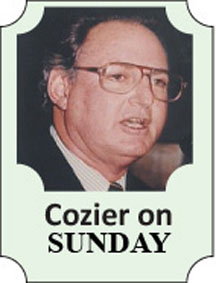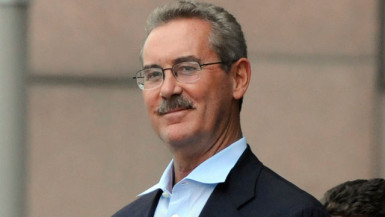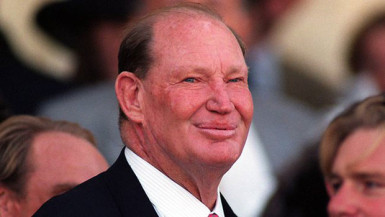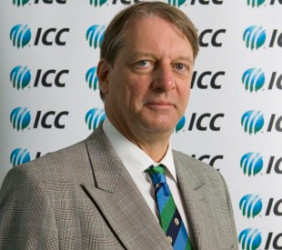Allen Stanford’s rare interview with the British Broadcasting Corporation (BBC) from his cell at the high-security jail in Florida last week revived mixed memories of the Texan billionaire’s involvement in West Indies cricket.
 It ended in 2009 with his imprisonment for an unlikely 110 years on charges by the United States’ Security and Exchange Commission (SEC) of fraud, conspiracy and obstruction, most of it connected to his multi-million dollar T20 tournaments in Antigua, one of the bases for his financial empire.
It ended in 2009 with his imprisonment for an unlikely 110 years on charges by the United States’ Security and Exchange Commission (SEC) of fraud, conspiracy and obstruction, most of it connected to his multi-million dollar T20 tournaments in Antigua, one of the bases for his financial empire.
In the interview, he spoke of his ‘hell’ in jail, of the severe beatings by inmates to which he was initially subjected, verified by the widely circulated images of his bloodied face as he was stretchered to hospital. It was physical degradation to follow the initial shame as he was led to his cell by three female guards, handcuffed and wearing the familiar orange garb of American criminals.
Far from sounding a broken man, Stanford was defiant. “I didn’t do anything wrong,” he asserted. “Will I apologise? No. Mark my words…I am going to walk out of these doors a free man.”
He boasted that he had been ‘one of the wealthiest men on the planet’ who needed his six jets to fly between his offices in 14 countries.
Knowing Stanford through day-to-day contact as part of the international tv panel employed to commentate on his matches that were transmitted live throughout the Caribbean and beyond, such lack of remorse for those who lost millions in his US$7 billion Ponzi scheme was not surprising. It was the misplaced self-confidence that prompted him to file for a rehearing of his case, even after his latest appeal was turned down last November.

From the start, there were inevitable comparisons with Kerry Packer and his launch of World Series Cricket in Australia three decades earlier on which I was also one of the tv commentators. Certainly both were physically imposing, ruthless individuals with similar expectations from their cricketing ventures.
When the WSC West Indies team performed well below what Packer considered was their immense potential, he stormed into the dressing room to deliver a withering warning to improve or else.
When a faulty sound system echoed so to that he came across “like the track of a Japanese film,” at one of his orations, Stanford instantly sacked the company responsible, hired from Trinidad at great expense.
These were the similarities between the two. The glaring difference was that Packer’s venture was perfectly legal, Stanford’s completely illicit.

In 2006, proclaiming he had become a big enthusiast of cricket during his quarter-century in Antigua, he pumped US$38 million into the Stanford T20 tournament, the first of its kind in the Caribbean. Its aim, he asserted, was to restore the region’s flagging game back to its former glory.
It was staged entirely at the small, neat, purpose-built, floodlit Stanford Cricket Ground adjacent to the international airport, encircled by boards exclusively advertising Stanford’s diverse interests, including two inter-island airlines that transported players and officials. It was all within the Stanford Complex comprising also the Stanford Investment Bank and Stanford offices, restaurants and newspaper plants. Television cameras were repeatedly trained on him.
It fully explained his need to succeed at all costs.
He dished out US$280,000 in the inaugural series to each of the 19 participating teams for development and participation. Among them were the

Bahamas, Bermuda, Cayman Islands and US Virgin Islands that had always been excluded from the mainstream of regional competitions.
Prize money was beyond the wildest imagination of the modestly paid West Indian players – US$1 million to the champion team, US$500,000 to the runners-up. One shot, the six by Narsingh Deonarine that won the first final for Guyana, was worth US$25,000, Man of the Match Travis Dowlin pocketed US$100,000.
The prospects were exciting. Michael Atherton saw it as “perhaps the most significant event in world cricket at the moment.” Mark Nicholas wrote that “Stanford’s calypso cricket revolution might just save the game’s fall from grace.”
Such assessments seemed spot on. The Stanford ground was filled to its 4000 capacity for each match, the majority women and children, a new fan base.
No one expected the small fry to create upsets but it did boost their interest in West Indies cricket as well as giving the fishermen, hotel workers, carpenters and the like who made up their teams their moment in the tv spotlight.
Eminent former players were engaged as directors of the operation, including West Indies selectors Gordon Greenidge and Andy Roberts, and consultants. Even before the U.S. authorities moved in, Clive Lloyd, Desmond Haynes and Ian Bishop sensed that it was all too good to be true and opted out. Michael Holding stayed clear from the start. They were not the only ones to question where was all the was money coming from.
Wherever, Stanford’s ambition went further following the second tournament. He announced that he would provide another US$100 million over three years to stage an annual international T20 tournament at his ground, offering the West Indies Cricket Board (WICB) US$1 million to influence the International Cricket Council (ICC) to approve it. The ICC was unconvinced.
Stanford, sure that every man has his price, was undaunted. He proposed a play-off between four national teams with the winner to take on his Super Stars for a winner-take-all US$20 million.
In the end, for a variety of reasons, only the England and Wales Cricket Board (ECB) fell for the match, the self-styled 20-20 for US$20, on November 1, 2008. It was the culmination of the Super Series that included the Stanford T20 champions, Trinidad and Tobago, and the ECB champions, Middlesex.
Most England players were reluctant, unprepared participants. They were irked by their designation as ‘England’, rather than a less official title, while the West Indians were, unavoidably, the Stanford Super Stars. Stanford’s ostentatious landing at hallowed Lord’s in a helicopter carrying a case supposedly filled with the US$20 million, to be greeted by ECB head Giles Clarke and CEO David Collier, was another deterrent. The powerful British press was suitably outraged.
The aversion to Stanford, and the ECB, further intensified when he was shown on international tv coverage, surrounded by the wives of England players with wicket-keeper Matt Prior’s, who happened to be pregnant at the time, on his knee.
The closest he came to an apology in his BBC discourse was to state that the embarrassment this caused the ECB “breaks my heart.” Even then, he maintained, it was not directly caused by him but by his “wrongful prosecution.”
Stanford ensured that his Super Stars had none of England’s hang-ups. He appointed Sir Viv Richards chief selector and assembled his men in Antigua for a tough, lengthy training period under coaches Eldine Baptiste and Roger Harper. No balls in the nets drew a fine. One player was dismissed for smoking marijuana.
The upshot was a thumping victory by 10 wickets. Jonathan Agnew, the BBC commentator, said he hadn’t seen a recent West Indies team “as fit, focused, motivated or well prepared.” Nor has any been since the Stanford Super Series collapsed on its financier’s arrest and conviction. The WICB failed to take note.
Stanford’s demise did not hurt cricket alone.
In Antigua, hundreds of investors lost all they had in the billionaire Texan’s swindle. Contrary to reports, only one of the players is known to have ploughed their earnings back into investment with Stanford. It is certain that hundreds of those on his payroll as the major employer of the island’s population of 80,000 were instantly out of a job.
It is an affair West Indians would rather best forget. Stanford’s detailed version of events to the BBC has been completely ignored by the regional media. Nowhere can a report of its contents be found.
They have heard his braggadocio too often for it to be repeated.









